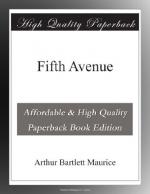Pleasanter to recall are the sober, industrious men and women who were denizens of the neighbourhood in the years gone by—Mademoiselle Berthe and her little sisters, fabricating roses and violets out of muslin and wax in their attic apartment, Madame Lange, the blanchisseuse, ironing in front of an open window, Triquet, the charcutier, Roux, the bottier, Malvaison, the marchand de vin. Then there were others of the colony, higher in the social scale and less prosperous in their finances, the impecunious music-teachers and professors of languages who maintained themselves with a frosty air of shabby gentility on a very slender income, and the practitioners of literature and art who maintained themselves somehow on no income at all. For the leisure hours of these there were the innocent wine-shops of South Fifth Avenue, such as the Brasserie Pigault, which Bunner introduced to the readers of “The Midge” with a quaint conceit. The sign of the little cafe from without read: “A LA VILLE DE ROUEN. J. PIGAULT. LAGER BEER. FINE WINES AND LIQUEURS.” But its regular patrons knew it best from within, from the warm tables they liked to scan the letters backward, against the glass that protected them from the winter’s night. It was a quaint haunt, where gathered Doctor Peters and Father Dube, and Parker Prout, the old artist who had failed in life because of too much talent, and M. Martin, and the venerable Potain, who had lost his mind after his wife’s death, and Ovide Marie, the curly-haired musician from Amity Street.
But the prize exhibit, the piece de resistance of that old Bohemia of the French Quarter to the south of Washington Square was the Restaurant du Grand Vatel in Bleecker Street. Not only the French strugglers, but American artists and authors in embryo used to dine there substantially and economically. As Mr. Rideing described it: “The floor is sanded, and the little tables are covered with oil-cloth, each having a pewter cruet in the centre. A placard flutters from the wall, announcing a grand festival, banquet, ball, and artistic tombola in celebration of the eighth anniversary of the bloody revolution of March 18, 1871, under the auspices of the ’Societe des Refugies de la Commune’—’Family tickets, twenty-five cents, hat-room checks, ten cents’—from which we gather that the ‘Restaurant du Grand Vatel’ has some queer patrons. The landlady sits behind a little desk in the corner. She is a woman of enormous girth, with short petticoats which reveal her thick, white woolen socks; her complexion is dark, her eyes are black and deep, and large golden rings dangle from her ears.”




